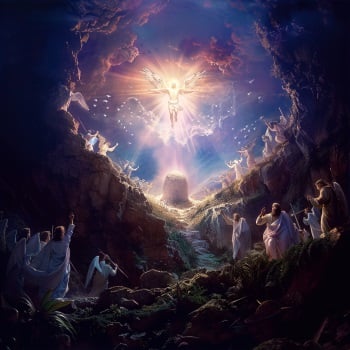The third approach, favored by Moffatt and others, is to understand theos as a qualitative: "and the Word was divine." Some consider this too weak to reflect John's intent (whatever that intent was), particularly since Greek has a perfectly good adjective, theios [divine], that John could have used if that were what he wanted to say.
People have been fighting tooth and nail over this issue for a long time (witness the many, massive debates in the archives of the b-greek list, for example), because how one understands theos in John 1:1c has profound ramifications for one's Christology. As we have seen, however, the Greek is ambiguous. Any attempt to resolve this issue fully would have to examine not only the linguistic details of the Greek, but also the religious and historical setting in which John wrote (i.e., the religious difficulty in predicating the word "God" of Jesus in the Church of the first century C.E., whether the indefinite reading would be perceived as polytheistic in a Hellenistic culture, etc.).
I do not claim to have the answer to this issue. My own (tentative) approach is to favor the qualitative view. I think the emphasis in clause c is on the nature of the Word, not his identity. I view the Jehovah's Witnesses rendering, with its strongly Arian emphasis, as inadequate based on the word order, which placed "God" at the beginning of the clause for emphasis. The Word was not just any god; the relationship of the Word with the God of clause b is very strong. The NEB paraphrase, by following the Greek word order, captures this aspect of the situation well: "What God was, the Word was."
On the other hand, if we were to read theos in clause c as definite, that would suggest that John was equating the Word with the God of clause b, and I do not believe that was his intention. In several places John's Gospel preserves the distinction between the Father and the Son, as in John 14:28: "for my Father is greater than I." To simply equate the Word with the Father would be problematic for both Mormons and more orthodox Christians, because it would suggest a Sabellian concept of God (that is, that the Father and the Son are simply different roles of one God, rather than separate persons). While the orthodox conception of the trinity is ontological and the Mormon conception is social only, nevertheless this approach resolves the problem for both traditions.
These days many Christians are so intent on arguing against the Arianism of the Jehovah's Witnesses view that they fail to recognize that their position (i.e., that theos is definite) is more consonant with the Sabellian heresy than their own orthodoxy. But more thoughtful Christians have long been aware of the problem and have followed a more balanced approach. In fact, the venerable history of this approach reaches back to Luther, who declared that the lack of an article is against Sabellianism, while the word order is against Arianism.
In reviewing this situation, it is not my intention to solve this problem. Rather, my purpose is to illustrate a case where there is a serious, consequential disagreement over the meaning of the Greek text, and yet an appeal to Greek linguistics is inadequate to resolve the problem. A definitive resolution, which does not yet exist, would have to take other factors into account, such as the religious, historical, and cultural background to the statement. To date, most arguments concerning the meaning of John 1:1c (including my own) have been dominated by theological rather than linguistic considerations (including the importation into this statement of post-Nicene thought). There are some problems for which an appeal to the Greek text, by itself, is simply inadequate to resolve.
[The title to this post was inspired by Sarah Silverman's "Jesus is Magic" comedy routine.]




